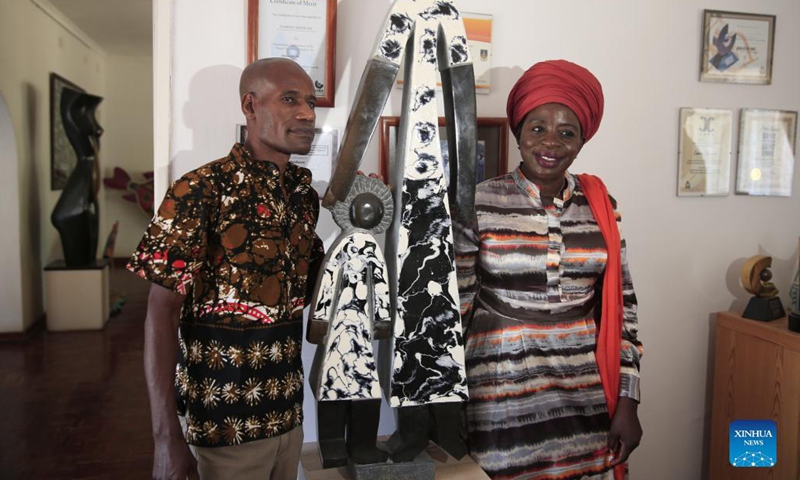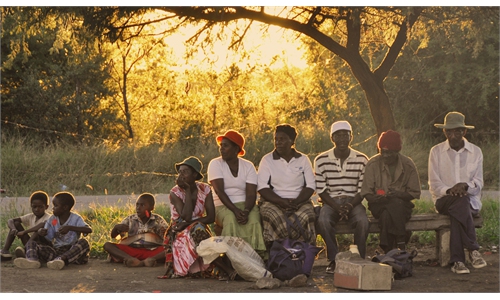
David Ngwerume, one of Zimbabwe's most decorated artists, who is known for his pandemic-inspired art, shows his artwork to Zimbabwe's Acting Minister of Youth, Sport, Arts and Recreation Sekai Nzenza at his studio in Harare, Zimbabwe, Dec. 9, 2021. Two of Zimbabwe's renowned stone sculptors will showcase their talent at the 9th Beijing International Art Biennale which will start next month.(Photo: Xinhua)
The curtain came down on the Zimbabwe International Film Festival (ZIFF) on Saturday, with local film productions amplifying African voices in the entertainment industry.
The festival, which ran from September 14 to 17, saw audiences being entertained by a wide range of international and local productions, including the first Zimbabwean sci-fi film in the Ndebele language.
"This year [2022] every single one of our evening highlight films is a Zimbabwean production, and that is something that we are so proud of, and it shows also where our film sector is going, it's heading in a great direction, I think," Nakai Matema, a Zimbabwean film practitioner, and a ZIFF consultant told the Xinhua News Agency.
The ZIFF is an annual film festival whose mission is to discover and develop local filmmakers, artists and audiences. It is a major promoter of the film industry in Zimbabwe and the African continent.
"It's important for us to develop our own film industry in Zimbabwe because film is a representation of us. Our heritage, our culture, our stories," said Matema.
Historically, the African narrative has been told through the Western perspective, Matema said.
Like in many developing countries, in Zimbabwe screens are largely dominated by foreign productions.
"It's important for us to not just be watching foreign productions particularly Western productions, first world productions, and even Asian productions when we are not watching our own.
"Those productions are great and they can be entertaining, but we definitely need to nurture our own representation on screen telling our stories, and our culture, our heritage, and don't wait for somebody else to come and tell our story on our behalf," she said. In addition, Matema said Africans need to be masters of their own narratives.
"It's very, very important, otherwise what will happen is people from America, England and whereever will come and tell our stories through their own lens," she added.
The veteran film director said despite being on a positive trajectory, the local film sector is still facing challenges such as financial constraints and skills training.
Daniel Lasker, a Zimbabwean film director and actor, and the director of The Signal, the first locally produced sci-fi film, said "it is important to narrate our own stories."
"I believe it's so important for us here in Zimbabwe to really develop our film industry and tell our own stories because there is so much unique locations, the culture of the people, and there is really special opportunities to tell stories that can't really be told from anywhere else in the world," Lasker told Xinhua.
Xinhua


